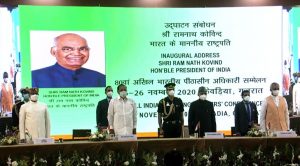Daily Current Affairs for Government Exams:
Today Current Affairs: 27th November 2020 for UPSC IAS exams, State PSC exams, SSC CGL, State SSC, RRB, Railways, Banking Exam & IBPS, etc
Table of Contents
Contents:
- 80th All India Presiding Officers Conference
- Trends in Air Pollution: CPCB:
- Period Products (FREE PROVISION) (Scotland) Bill:
- Draft of the Merchant Shipping Bill, 2020:
- Initiatives for Transgender Persons:
- Awards for Tiger Conservation:
- Other important current affairs:
1.80th All India Presiding Officers Conference :

The Prime Minister of India has addressed the concluding session of the 80th All India Presiding Officers Conference via videoconference, at Kevadiya (Gujarat) on the occasion of Constitution Day (26th November).
- He raised the pitch for ‘One Nation, One Election’, a single voter list for all polls and also asked the presiding officers to simplify the language of statute books and allow for an easier process to weed out redundant laws.
- He also paid tributes to the security forces and appreciated India’s efforts to fight terrorism. The day marked 12 years of the Mumbai terror attacks.
One Nation, One Election:
- The idea is about structuring the Indian election cycle in a manner so that elections to the Lok Sabha and the State Assemblies are synchronized together so that the election to both can be held within a given span of time.
- Advantages:
- Help keep a check on the poll expenses, party expenses, etc. and also save public money.
- Reduce the burden on administrative setup and security forces.
- Ensure timely implementation of the government policies and also ensure that the administrative machinery is engaged in developmental activities rather than electioneering.
- Solve the problem of governance on the part of the politicians who are ruling.
- It is generally seen that for short term political gains from a particular assembly election, ruling politicians avoid taking a harsh long term decision which can ultimately help the country in the long run.
- Provide more time to all the stakeholders i.e. political parties, Election Commission of India (ECI), paramilitary forces, civilians for the preparation of elections once in five years.
2.Trends in Air Pollution: CPCB:

According to a recent study commissioned by the Central Pollution Control Board (CPCB), the rate of increase in pollution levels in southern and eastern India is far greater than the Indo-Gangetic plain (IGP).
- It has also found that air pollution in rural areas has increased at par with urban India.
About the Study:
- It was jointly carried out by IIT-Delhi and CPCB and analyzed data from 2000 to 2019.
- Currently, the process of collating and analysing the 2020 data is going on as well and a decrease in pollution levels is expected in the coming years.
- The study, conducted on the basis of satellite data, is the first of its kind to look at air pollution spatially.
- Spatial mapping of pollution will be vital for the government to form its future policies under the National Clean Air Programme (NCAP).
Findings:
- The rate of increase of PM2.5 over eastern and southern India is more than 1.6% per year during this period, and less than 1.2% annually in the IGP.
- PM2.5 are fine inhalable particles, with diameters that are generally 2.5 micrometers and smaller.
- It is a major pollutant affecting the environment, human health and the climate.
- 436 cities/towns with a population of more than 1 lakh in 2019 exceeded the National Ambient Air Quality Standard (NAAQS) of 40 micrograms per metric cube (μg/m3).
- Population-weighted 20-year averaged PM2.5 over India is 57.3 μg/m3, with a larger increase observed between 2010 and 2019 than in the 2000-09 period.
- As of 2019, 99.5% of districts in India did not meet the World Health Organisation (WHO) air quality guideline of 10 μg/m3.
Statewise Data:
- Ambient PM2.5 exceeds the annual NAAQS of 40 μg/m3 in every state except for Jammu and Kashmir (J&K), Ladakh, Himachal Pradesh, Sikkim, Arunachal Pradesh, Manipur, and Nagaland.
- The PM2.5 level in the IGP, which has a population of more than 70 crores, and the western arid region is more than double the annual NAAQS.
- In Odisha and Chhattisgarh, which have reported among the highest increase in air pollution in eastern India, this is due to mining activities and thermal coal power plants.
- In southern India, high urbanization in and around cities such as Bengaluru or Hyderabad has led to increased emissions.
- Unfavorable meteorological conditions in eastern and peninsular India, along with an increase in emissions, has led to an overall increase in PM 2.5.
3.Period Products (FREE PROVISION) (Scotland) Bill:

The Scottish parliament passed a landmark legislation that has made period products such as sanitary pads and tampons free of cost to those people who need them.
- The bill is titled, “Period Products (Free Provision) (Scotland) Bill” and was passed unanimously by the Scottish Parliament on November 24, making Scotland the first country to take such a step.
- The bill was passed with the aim of tackling “period poverty”, which is when some people who need period products struggle to afford them.
- One of its central objectives is to “end the silence and stigma” that surrounds menstruation and also aims to remove “gendered barriers”. The bill aims to ensure that those who menstruate have “reasonably convenient” access to period products free of charge.
- Certain circumstances make access to sanitary products difficult for women and trans people. These include homelessness, coercive, controlling and violent relationships and health conditions such as endometriosis.
4.Draft of the Merchant Shipping Bill, 2020:

Ministry of Ports, Shipping, and Waterways have issued a draft of the Merchant Shipping Bill, 2020 for public consultation. It aims to repeal and replace the Merchant Shipping Act, 1958 and the Coasting Vessels Act, 1838.
About:
- To improve the welfare of Indian seafarers on abandoned vessels and safety of such vessels, the Bill has provisions for repatriation of abandoned seafarers have been enhanced, in line with the Maritime Labour Convention regulations.
- To promote ease of doing business, the Bill does away with the requirement of a general trading license for Indian vessels.
- It also enables electronic means of registration, and grants statutory recognition to electronic agreements, records, and log-books, in addition to electronic licenses, certificates and payments, stated the release.
- The Bill has clauses to increase India’s tonnage and to make the vessel a tradeable asset.
- To promote India as a bankable shipping jurisdiction and avoid situations leading to wreck, the proposed Bill seeks to introduce for the first-time statutory framework for regulating maritime emergency response against maritime incidents
- To make India an active enforcement jurisdiction, the Bill incorporates powers of the Director-General to take action against vessels that are unsafe, and pose a threat to the safety of life at sea and environment
- The Bill also encourages the active enforcement of pollution prevention standards.
5.Initiatives for Transgender Persons:

The Ministry of Social Justice and Empowerment has launched the National Portal for Transgender Persons and has inaugurated Garima Greh, a shelter home for transgender persons.
National Portal for Transgender Persons:
- It has been launched in consonance with the Transgender Persons (Protection of Rights) Rules, 2020.
- It would help transgenders in digitally applying for a certificate and identity card from anywhere in the country, thus preventing any physical interaction with officials.
- It will help them track the status of application, rejection, grievance redressal, etc. which will ensure transparency in the process.
- The issuing authorities are also under strict timelines to process the applications and issue certificates and I-cards without any necessary delays.
Garima Greh:
- It has been opened in Vadodara, Gujarat and will be run in association with the Lakshya Trust, a community-based organisation entirely run by the transgenders.
- The Scheme of ‘Shelter Home for Transgender Persons’ includes shelter facility, food, clothing, recreational facilities, skill development opportunities, yoga, physical fitness, library facilities, legal support, technical advise for gender transition and surgeries, capacity building of trans-friendly organizations, employment, etc.
- The scheme will rehabilitate a minimum of 25 transgender persons in each homes identified by the Ministry.
10 cities have been identified to set up the 13 Shelter Homes.
Transgender Persons (Protection of Rights) Rules, 2020
- The Central Government made the rules under the powers conferred by the Transgender Persons (Protection of Rights) Act, 2019.
- The Act came into effect on 10th January 2020, which is the first concrete step towards ensuring welfare of transgender persons.
- The rules seek to recognise the identity of transgenders and prohibit discrimination in the fields of education, employment, healthcare, holding or disposing of property, holding public or private office and access to and use of public services and benefits.
- In 2014, the Supreme Court of India, in the case of the National Legal Services Authority versus Union of India, established the foundation for the rights of transgender persons in India by recognising ‘transgender’ as a ‘third gender’ and laying down several measures for prohibition of discrimination against transgender persons and protection of their rights.
- The judgment recommended reservations for transgenders in jobs and educational institutions and their right to declare the self-perceived gender identity without undergoing a sex reassignment surgery.
6.Awards for Tiger Conservation:

The Pilibhit Tiger Reserve (PTR – Uttar Pradesh) has bagged international award TX2 for doubling the number of tigers in the past four years.
- Also, the Transboundary Manas Conservation Area or TraMCA (India-Bhutan border) has received the Conservation Excellence Award for 2020.
- Earlier, India’s 2018 Tiger census (once in every four years) had set a Guinness record for being the largest camera-trap wildlife survey.
- About the Awards:
- Launched recently, these awards were open to submissions from any site in a tiger range country that has achieved remarkable measurable progress since 2010.
- Site: An area having a functional tiger population, legally designated as a “site” under national legislation.
- Award winners were announced on 23rd November 2020 – the 10 year anniversary for the global TX2 goal.
- Sites will receive a small financial grant to be used to further tiger conservation.
- TX2 Award: It goes to one site that has achieved remarkable and measurable increase in its tiger population since 2010.
- Conservation Excellence Award: This award recognises one site that has achieved excellence in two or more of these five themes:
- Tiger and prey population monitoring and research (tiger translocation/prey augmentation),
Effective site management, - Enhanced law enforcement & protection & ranger welfare improvement,
- Community based conservation, benefits and human-wildlife conflict mitigation and
- Habitat and prey management.
- TX2 Goal
- Tiger and prey population monitoring and research (tiger translocation/prey augmentation),
- The TX2 goal is a global commitment to double the world’s wild tigers by 2022.
- The goal has been set by the World Wildlife Fund (WWF) through the Global Tiger Initiative, Global Tiger Forum, and other critical platforms.
- All 13 tiger range governments came together for the first time at the St Petersburg Summit (Russia -2010) where they committed to double the number of wild tigers by 2022.
- Tiger Range Countries include India, Bangladesh, Bhutan, Cambodia, China, Indonesia, Lao PDR, Malaysia, Myanmar, Nepal, Russia, Thailand and Vietnam.
- Tiger (Panthera Tigris) is categorised as ‘Endangered’ under the IUCN Red List and is listed under Appendix I of CITES.
- Global Tiger Day is observed on 29th July across the world.
- India’s Project Tiger was launched in 1973 with 9 tiger reserves. Tiger has been listed under ‘Schedule I’ of the Wildlife Protection Act, 1972.
Pilibhit Tiger Reserve:
- Location: Pilibhit district, Lakhimpur Kheri District and Bahraich District of Uttar Pradesh
- The northern edge of the reserve lies along the Indo-Nepal border while the southern boundary is marked by the river Sharada and Khakra.
- Declaration: PTR was declared in 2014-15 on the basis of its special type of ecosystem with vast open spaces and sufficient feed for the elegant predators.
- PTR is one of the finest examples of the exceedingly diverse and productive Terai ecosystems (low-lying land at the foot of the Himalayas).
- Features:
The study done by the Wildlife Institute of India (WII) shows that the Dudhwa-Pilibhit population has high conservation value as it represents the only tiger population with the ecological and behavioral adaptations of the tiger unique to the Terai region. - It is home to a habitat for over 127 animals, 326 bird species, and 2,100 flowering plants.
- Wild animals include tiger, swamp deer, Bengal florican, hog deer, leopard, etc.
- It has high sal forests, plantations, and grasslands with several water bodies.
- Bagged TX2 Award: The number of tigers in the reserve area has gone up to 65 from 25 in the period of just four years (2014-18).
Other important current affairs:
1.President of the United States of America (USA) has exercised his powers under the constitution to pardon his former National Security Advisor.
- Unlike the USA President, whose powers to grant pardons are almost unrestrained, the President of India has to act on the advice of the Cabinet.
- Pardoning Power of the President in the USA:
- The President of the USA has the constitutional right to pardon or commute sentences related to federal crimes.
- Clemency is a broad executive power, and is discretionary which means the President is not answerable for his pardons, and does not have to provide a reason for issuing one. But there are few limitations.
- The USA has a Presidential system.
- The USA Supreme Court has held that this power is granted without limit and cannot be restricted by Congress (legislature).
- Limitations:
- All Presidents shall have power to grant Reprieves and Pardons for offenses against the United States, except in cases of impeachment.
- Further, the power only applies to federal crimes and not state crimes.
- Those pardoned by the President can still be tried under the laws of individual states.
2.The Union Cabinet has given its approval to the proposal for equity infusion by the Government of Rs. 6000 crores in NIIF Debt Platform – sponsored by the National Investment and Infrastructure Fund (NIIF).
- This was one of the twelve key measures made by the Union Minister for Finance as part of the Government of India’s stimulus to the economy, under Atmanirbhar Bharat.
- As per the National Infrastructure Pipeline (NIP), investment in the infrastructure sector is targeted at Rs. 111 lakh crore over the next 5 years across various sub-sectors, creating a substantial need for debt financing.
- It would require at least Rs. 60 to 70 lakh crores in debt financing.
- Current environment requires well-capitalized specialized infrastructure-focused financial institutions, such as NIIF Debt Platform being developed by NIIF which can focus on lending across the project life cycle with a strong capital base and expertise-driven approach.
- The current approval of equity infusion is subject to two conditions:
- Out of the proposed amount, only Rs. 2,000 crore would be allocated during the current year 2020-21.
- However, in view of the unprecedented financial situation and availability of limited fiscal space due to the prevailing Covid-19, the proposed amount may be disbursed only if there is readiness and demand for debt raising.
- NIIF will take all necessary steps to use the equity investments from Domestic and Global pension funds and sovereign wealth funds expeditiously.
3.Films Division (FD) is organizing Lok Virasat, a festival of films on folk art and painting starting from November 27, 2020.
An exclusive bouquet of documentary films on folk art and paintings – Lok Virasat – is being showcased, between November 27–29, 2020 on the FD website and YouTube channel.
- The films being streamed include:
- The Kingdom of God, on the great Indian heritage of art and culture with a focus on various folk art traditions,
- Bhavai – Fading Memories, a film on Bhavai – a folk art of Gujarat,
- Naman – Khele, a film on the ancient folk art performed in Ratnagiri, Maharashtra,
- Sahi Jata, The Fusion Cult, a film on the unique fusion of muscle and music in the form of folk art on the back-drop of the ancient Orissa town of Puri and
- Therukoothu : Dancing For Life , a film depicting the age old Tamil folk art.
4.United Nations Development Programme (UNDP) and Invest India have launched the Sustainable Development Goals (SDGs) Investor Map for India.
- It laid out 18 Investment Opportunities Areas (IOAs) in six critical SDG enabling sectors, that can help the country push forward on the trajectory of Sustainable Development.
- The six focus sectors identified in the map include education, healthcare, agriculture and allied activities, financial services, renewable energy and alternatives and sustainable environment.
- Of the 18 IOAs identified, 10 are already mature investable areas that have seen robust Private Equity and Venture Capital activity. The remaining eight IOAs are emerging opportunities, which have seen traction from early-stage investors.
- The map has also identified eight ‘white spaces’, which have seen investor interest and have the potential to grow into IOAs in five to six years with policy support and private sector participation.
5.Andhra Pradesh government recently told the Supreme Court that Andhra Pradesh High Court has “virtually taken over the executive functions of the State”.
- Instances in support of this allegation: A November 2 direction of the High Court to the State to submit before it the construction plans for a guest house proposed in Vishakapatnam.
- The state government says that the High Court had “seriously violated the doctrine of Separation of Powers”.
- Besides, in doing so, the High Court has completely ignored the warning that the Supreme Court has, time and again, sounded advising the courts to respect the other co-equal organs of the State and to refrain from assuming such powers to itself.
- A 2008 judgment of the Supreme Court said “in the name of judicial activism, judges cannot cross their limits and try to take over functions which belong to another organ of the State”.
- The independence of the judiciary is jeopardized when courts become embroiled in the passions of the day (Observation made by the U.S. Supreme Court).




